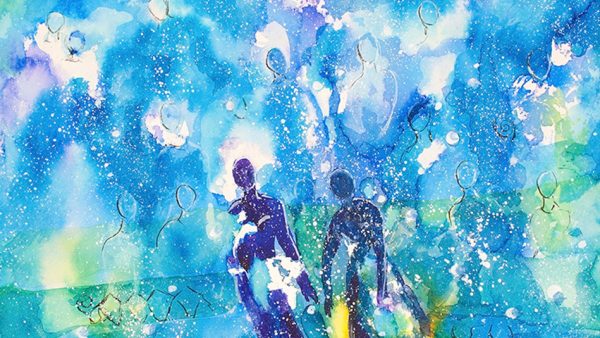Haha, you astute people picked up my editing faux pas (pubic instead of public.) Well, before you think I’m that ADHD (which I am) let me tell you a story. I went back into my files to look at the transcribed interview in Word and it clearly reads “public.” So, sometime during the cut and paste, some little rascal (I won’t name any names) tweaked things a bit. So, I’m not even going to bother editing this one.
Me: Have you reincarnated or do you even plan to?
Elisabeth: I have not. I plan to stay here to help those who have come to life and to spread the word of caring for dying. My overall goal is to continue to raise awareness about hospice care, but specifically for children and infants with terminal illnesses.
Jamie: She talks so easily.
Elisabeth: I’m still going to work with the people on Earth to help build hospice care for infants and children.
Me: How wonderful. Now, one more question. It’s a two part one, really. What do you think about the state of humanity now, and do you have any messages for us?
Elisabeth: I think the state of humanity is at a very delicate crossing. You’re very vulnerable to those who claim to be helping but then quickly turn on you take away your rights and your gifts. It’s very important for the spiritual people in the business setting to stand up and help protect the public as a whole. The message I would give is this: Death is just as celebratory as birth. If we could instill that in every human being, then the grief process that we are choosing will be altered drastically. We’d have a happier community for it.
Me: Okay. Well, thanks so much Elisabeth.
Jamie: She puts her hands together and bows her head and says, “Thank you for the time; thank you for opportunity today. God bless you.
Me: Aw.
Jamie: She turns and says the same thing to Erik.
Erik (to Elisabeth): I’ll walk you out.
Me: Aw, that’s sweet!
Second Interview
Me: You know, Erik, there are several questions I forgot to ask Elisabeth Kubler-Ross. I don’t know what happened to my brain that day, and I really feel bad but do you think you can go get here again?
Erik: No problem, Mom. You know I’m always willing.
Jamie: It’s kind of funny how he says it. He’s always willing—with emphasis on “always.”
Me: Aw.
(Long pause)
Jamie: This is where we need that waiting music/
I hum the Jeopardy game show music.
Me: As long as it’s not elevator music.
Jamie: More like heavy lead guitar.
Me: Yes, with some nice riffs. I like it.
Jamie: Okay. Oh, there’s another man with her.
Me: Really? Hello again, Ms. Kubler-Ross. How are you doing?
Elisabeth: Hello.
Me: Who do you have with you?
Jamie: Um, he’s an older white haired man. He does work with science. He’s a scientist.
Me: Mm hm.
Jamie: She’s been working with—
Jamie laughs.
Jamie: I’m so sorry. It’s just so surreal sometimes that you just gotta go, “I’m not being screwed with, right?”
I giggle at Jamie’s response.
Jamie (to Elisabeth): So this is Newton?
Me: Sir Isaac Newton?
Jamie: Uh, yes.
Me: Okay.
Jamie (to Elisabeth): Why are you bringing him?
Me: Hi, Mr. Newton. The guy who likes apples, right?
Newton (laughing): I’ll be forever remembered for that.
Me: Yes, you will.
(Pause)
Jamie (with a loud guffaw): Okay, so he’s not a big talker! He just said it and stopped and looked at me. He’s got a very furrowed brow.
Me: Oh, okay. Well, Ms. Kubler-Ross, I want to apologize. I totally forgot to ask you all of the questions I wanted to during our first interview! Will you ever forgive me?
Elisabeth: Oh please, you don’t need to kiss my feet!
Me: Well, that’d be hard to do from where I am, but I would if I had to.
Elisabeth: What is it that you feel you forgot?
Me: Well, can you share another life that you think most influenced your last one—the one we’re all familiar with? I know you shared one before, but maybe you can tell us about another one.
Elisabeth (giddy with excitement): This question is so interesting!
Me: Isn’t’ it though?
(Pause)
Jamie: She’s talking about a life in Transylvania in a very dark time of the war. She has an accent. Sorry. It was a very dark time of the war.
Jamie listens to her for a several seconds.
Jamie (to Elisabeth): Oh, so this is Medieval Times?
Elisabeth: Death, death, death, everywhere. And the nature of death then was to remove the head and stake it.
Me: Ugh. Nice.
Elisabeth: It didn’t matter much if it was male or female. This purpose was to conquer the land.
Me: Now, you removed the head, uh, the heads were removed from the living or the dead.
God I was hoping it was the latter.
Elisabeth: The living.
Great.
Me: Hm. I was afraid you were going to say that.
Elisabeth: And then they were either hung or staked. They were placed in rows, almost in an ornamental fashion.
Me: This sounds familiar. Are we talking about Vlad the Impaler and his troops?
Elisabeth: Yes, but there were many others.
Me: Okay.
Elisabeth: When—
Jamie: No, I don’t know that word. I’m so sorry. Can you use another one?
Elisabeth: Okay. When the debacle was over, there would be a trail left behind of heads. The bodies were discarded and disregarded. So, I saw war as something that was so careless and thoughtless and something that caused a lot of death. I think this attraction to death carried over into this life, but I wanted to experience the opposing side of it—the healing aspect of death. I wanted to unwind—
Jamie (tentatively): I think she’s saying unwind.
Elisabeth: I wanted to unwind the heart and allow it to be accepting as it approaches death instead of being bound tighter and tighter until that point of death—not letting death become the grim reaper, but allowing it to become a gift. We need to be the ones to reach out and open it. We need to be the ones to remove the lid and look at the joy of receiving this gift.
Me: Beautiful.
Jamie: Yeah, but awful visuals earlier.
Me: Poor Jamie. But I can see how that time period must have influenced your life. Thank you for sharing it. Now, once you transitioned into the afterlife, into that dimension you’re in now, what insight did you gain? Did you have any epiphanies?
Elisabeth: Upon crossing, I was most amazed at the ease. Some people become overwhelmed just at the idea of having to climb or walk, but none of that is necessary. It’s a physical ease. I also was quite aware of –
Jamie (at Elisabeth, laughing): Do you want to say that?
Elisabeth: Yes!
Jamie: I don’t know her accent, but she’s got one.
Me: Well, what kind of accent do you have? I can’t remember. Are you German, Swiss?
Jamie: Oh, she said yes to Swiss.
Me: Okay.
Jamie: But, you know, the accent isn’t heavy. It’s not real heavy. I know she’s speaking American English, but it’s just every now and then, um, it’s just cute.
Elisabeth: What I learned was all that I taught on Earth: the steps, the process—I know that I put it together that way for the humans to understand that in the truth of the matter, it’s not that way at all. It made me smile very big. I never felt that my work was useless or weak. I’m very proud and feel strongly about what I put together because it’s laid the foundation for letting people see beyond and to an easier way of acceptance.
Me: Oh, yeah. Mm. Your work is so inspirational and has changed so many lives all over the world. Now, what do you think you’re spiritual mission was here on Earth? It’s obvious to me, but for our readers, I’d love to have a full statement from you.
Elisabeth: Well, it was to teach about death.
Me: Yes, of course. Oh, and I forgot to ask you, why is Sir Isaac Newton there with you?
Elisabeth: The two of us have been working together because science is making such huge leaps in efforts to change the face of belief systems. We’re not going into a world of technology like most people believe science would want to do. Science is actually going to present to us—to the humans—that there is a greater world of possibilities that others thought was imagination based. Well, it’s not. It’s factually based. A lot of that will involved the communication beyond dimensions.
Me: So interesting! Erik, do you have any questions from either Ms. Kubler Ross or Sir Newton?
Erik: No, I’m good.
Me: Well, thanks so much for coming back for a curtain call!
Elisabeth: Any time you need it.
Me: You’re sweet. This interview is one of the ones that the Channeling Erik members have eagerly been waiting for, because the blog is about death, grieving, the afterlife, the human experience and things of that nature. So, your input is very valuable. We may have to call on you again!
Jamie: That’s exactly what she suggested!
Elisabeth: Why don’t we have a day when I come in with Erik and we both answer questions from your readers?
Me: Okay. That sounds like a wonderful idea. An Elisabeth Kubler-Ross Day!
Elisabeth laughs.
Me: Well, thank you so much Ms. Kubler-Ross. We’ll talk to you soon. And Sir Newton, thank you for coming by and for all of your incredible contributions to science.
Sir Isaac Newton: It is my pleasure.
Elisabeth: Remember, there are no mistakes, no coincidences. Everything that occurs, everything around us is a blessing given to us. These blessings are lessons from which we must learn.
Me: So true.
Elisabeth (raising her arm, pointing upward): Remember this!
Me: I will. I will. Thank you again.
Elisabeth (waving): Thank you.
Jamie (laughing): She’s gone. It’s funny. I’m laughing, because she’s kind of butchy.
Me: Well, I think a lot of the female scientists and philosophers of her era you had to have a lot of male qualities. It was such a male dominated field you know.
Please, please watch this short video about EKR. It really encapsulates her and her work.



